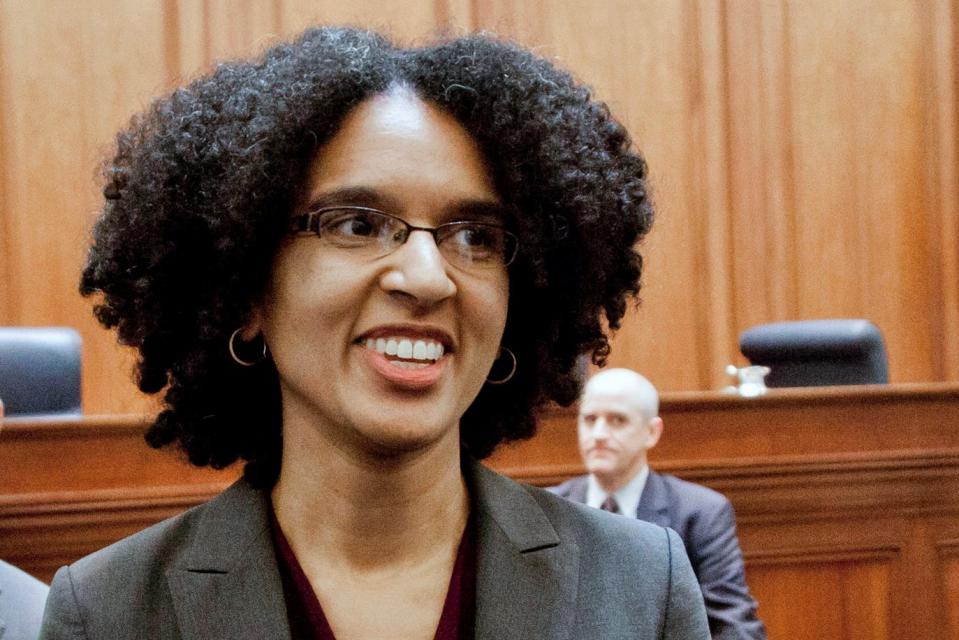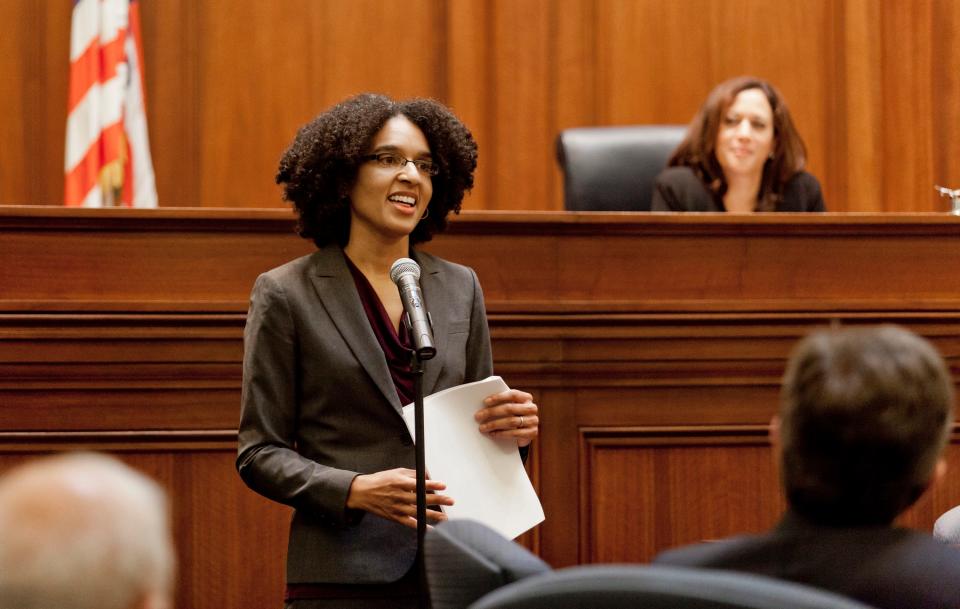Who is Justice Leondra Kruger? For starters, she's argued a dozen Supreme Court cases
- Oops!Something went wrong.Please try again later.
- Oops!Something went wrong.Please try again later.
- Oops!Something went wrong.Please try again later.
- Oops!Something went wrong.Please try again later.
- Oops!Something went wrong.Please try again later.
WASHINGTON – It could have been an awkward meeting when Leondra Kruger, an associate justice on California's Supreme Court, first sat down with the appellate judge she had just overturned in one of the highest profile decisions of her tenure.
At issue was a California law that allows police to collect DNA samples from anyone arrested for a felony. State Court of Appeal Justice J. Anthony Kline ruled the law violated the state constitution. Kruger disagreed and authored a 4-3 decision in 2018 reversing him.
They didn't see eye-to-eye on the case but Kline is quick to praise Kruger.
"We had a real disagreement but I personally perceived her ability," Kline, who retired last year, said with a chuckle as he recalled subsequent lunches when the case occasionally came up. "For a while she made me doubt the virtues of my own opinion."
"Now, you know, in the end," Kline added, "she did not."
Kruger is widely considered among the top candidates President Joe Biden is considering to replace Associate Justice Stephen Breyer on the U.S. Supreme Court. Supporters describe Kruger as a deliberate, precedent-focused jurist. Colleagues say she manages to do legal battle in a modest way that doesn't leave her adversaries with scars.
First Black woman: Race, gender become factors in Supreme Court confirmation battle
That skill could prove useful on the high court, whose 6-3 conservative majority has taken on some of the nation's most divisive issues in recent months, including abortion, guns, affirmative action and COVID-19 vaccine mandates.
"She has a capacity – really unlike I've ever seen – to digest everyone's different points of view," said California Supreme Court Chief Justice Tani Cantil-Sakauye. "If you happen to be on the disagreeing end of one of our opinions...she makes every effort to reach out and find a way to incorporate your view that is also congruent with hers."

Kruger is one of more than a dozen candidates Biden is considering for the seat Breyer held for nearly three decades. The president has promised to choose a nominee by the end of the month, marking the first time in history a Black woman will be selected for the nation's highest court.
Breyer intends to step down in June.
A Kruger nomination would check several boxes for Biden: At 45, she would be among the youngest justices ever to sit on the court – Associate Justice Clarence Thomas was 43 when he joined in 1991 – meaning she could serve for decades. She would also be the first justice from a state court since President Ronald Reagan nominated Associate Justice Sandra Day O'Connor in 1981.
"She's soft spoken. She's brilliant. She has impeccable credentials," said Erwin Chemerinsky, dean of Berkeley Law. "And she's had an experience that none of the other justices have had: She's been a state supreme court justice."
Though a California native, Kruger is well known in elite Washington legal circles, having served in the Department of Justice during both the Bush and Obama administrations. The Harvard College and Yale Law School graduate clerked for Associate Justice John Paul Stevens and Judge David Tatel of the U.S. Court of Appeals for the D.C. Circuit. While at the Justice Department, she argued a dozen cases before the U.S. Supreme Court.
One of Kruger's former bosses, Associate Justice Elena Kagan, was solicitor general before President Barack Obama nominated her to the high court in 2010.
The Biden administration had recruited Kruger to be solicitor general, the top lawyer representing the federal government at the U.S. Supreme Court. Kruger passed on the opportunity.
Responding to a question on a California judicial application in 2014, Kruger wrote that the integrity of the judicial system rests on an honest and evenhanded evaluation of the law.
"First, an appellate judge must approach each case with an open mind," she wrote.
Tatel: 'Prodigious' judge leaves mark on influential federal appeals court
The short list: Who is Judge Jackson? For starters, she once clerked for Justice Breyer
Given her time in President George W. Bush's administration and some of the more centrist legal positions she has staked out on the California court, Kruger was seen by some as a natural choice for Biden if Republicans had captured the Senate in 2020. When Democrats won two Georgia Senate races and the chamber's majority, attention shifted to Judge Ketanji Brown Jackson, who was confirmed in June for a spot on the D.C. Circuit.
The California DNA case, People v. Buza, is often one of the first observers note to underscore Kruger's independent streak. She joined three Republican-nominated justices over the dissent from three justices put on the state Supreme Court by Democrats.
But the issue has divided traditional alliances before, including on the U.S. Supreme Court. The nation's highest court considered a similar DNA collection law in Maryland in 2013. A 5-4 majority that included Breyer, Thomas and other conservatives ruled the DNA collection was permissible. The dissent in that case also comprised an unusual grouping: Associate Justices Antonin Scalia and Ruth Bader Ginsburg – the best-known conservative and liberal on the court at the time – joined together with the court's other liberals.

"She's very much someone who wants the law to make sense and wants to build consensus on the court as well," said Eric Konopka, an attorney who clerked for Kruger.
Kruger, who was the first justice on the California Supreme Court to give birth while in office, acknowledged that her hobbies and personal interests had changed since the birth of her first child. "I also enjoy learning foreign languages," she quipped in 2014 on the state judicial application, "although I have become mediocre (at best) at a very small handful of languages and fully proficient in none of them."
Several of Kruger's allies recall a U.S. Supreme Court case she argued in 2011 that most observers saw as a lost cause before she ever stepped into the ornate courtroom. A Michigan teacher who worked at a religious school sued her employer under the Americans with Disabilities Act. The school countered that it could take advantage of broad religious exemptions from the ADA's requirements.
Justices from both ends of the ideological spectrum tore into Kruger's argument that the religious exemption didn't apply. Scalia called it "extraordinary." Kagan said it was "amazing." Despite what observers described as an intense oral argument, Kruger handled the tough questioning with poise, supporters said. Several predicted her ability to remain cool under pressure bodes well for the rigor of a Senate confirmation hearing.
"She made the best argument for her client – the government agency seeking application of the law," said Walter Dellinger, a veteran Supreme Court lawyer who was representing the teacher in the case.
The high court wound up ruling against the teacher – unanimously. Dellinger said he had "no idea" whether Kruger personally agreed with the administration's policy.
"That was not her job," he said. "The relevant government agencies had a position and she argued it and argued it well."
This article originally appeared on USA TODAY: Who is Leondra Kruger? California jurist in the mix for Supreme Court

